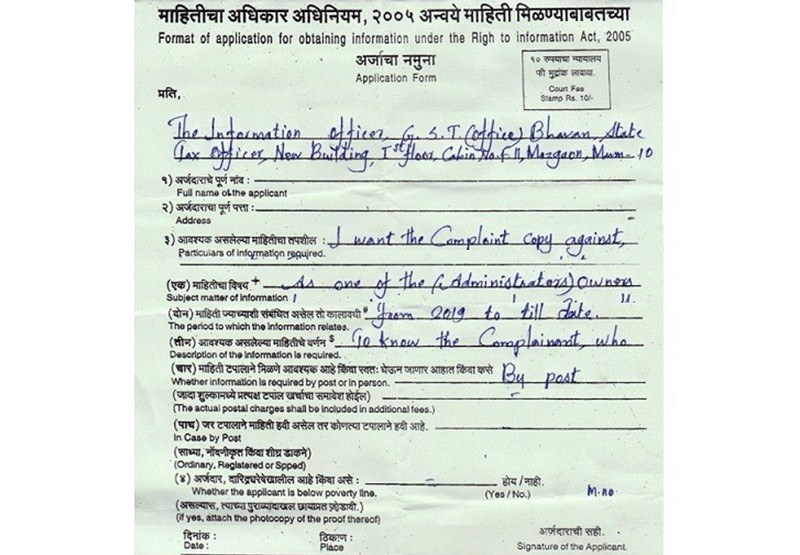
Right to Information (RTI) is an Act of the Parliament of India to provide for setting out the practical regime of right to information for citizens and replaces the erstwhile Freedom of information Act, 2002. Under the provisions of the Act, any citizen of India may request information from a “public authority” (a body of Government or “instrumentality of State”) which is required to reply expeditiously or within thirty days.
RTI Act mandates timely response to citizen requests for government information. It is an initiative taken by Department of Personnel and Training, Ministry of Personnel, Public Grievances and Pensions to provide a– RTI Portal Gateway to the citizens for quick search of information on the details of first Appellate Authorities,PIOs etc. amongst others, besides access to RTI related information / disclosures published on the web by various Public Authorities under the government of India as well as the State Governments.
GET INSTANT HELP FROM EXPERTS!
- Looking for any kind of help on your academic work (essay, assignment, project)?
- Want us to review, proofread or tidy up your work?
- Want a helping hand so that you can focus on the more important tasks?
Hire us as project guide/assistant. Contact us for more information
Website: https://rtionline.gov.in
How to file RTI application?
Here’s how to file an RTI (Right to Information) in case you need some information from the local authorities.
Want to know what is coming up besides your building, want to know who file complaint against whom (be it for GST, lofts, electricity, etc)? You can file an RTI.
Its not difficult, just fill the application form, affix Rs.10 court fee stamp / P.O / D.D.
Here are some samples attached.

You can Download RTI application format here.
Reasons why a request could be rejected
Having said that, the right to seek information from a public authority is not absolute!
There are several reasons why a request could be rejected. There are also several categories of information that are exempt from disclosure; certain Intelligence and Security Organisations are also exempt from the purview of the Act.
Here are the various reasons for rejection:
- Information covered under exemption from disclosure
- Information infringes the copyright of any person other than the state.
- Any information that could affect the sovereignty and integrity of India, or the security, strategic and scientific interests of the state, or its relation with foreign state or lead to incitement of an offence
- Information that has been forbidden to be published by any court of law or tribunal or the disclosure of which may constitute contempt of court.
- Information, disclosure of which, could cause a breach of privilege of Parliament or the state Legislature
- Information or trade secrets or intellectual property that could harm the competitive position of a third party, unless the competent authority feels this is in the interest of the larger public
- Information available to a person is his fiduciary relationship (sort of trustee), unless the competent authority feels this is in the interest of the larger public.
- Information received in confidence from foreign government may be denied
- Information that could endanger the life or physical safety of a person, or identify the source of information, or assistance given for law enforcement or security purposes
- Information which could hinder the process of investigation or prosecution of offenders; cabinet papers including records of deliberations of the council of Ministers, secretaries and officers.
- Information which would cause unwarranted invasion of the privacy of the individual
Closing Thoughts
The RTI Act is a great tool for the common man as it allows them to seek information from the government on important matters, such as how funds are being used for development projects. But it must be clearly understood that giving information to the citizens is the rule; and denying it is an exception. So, while RTI does provide you with lots of information, there are a few types of information that is exempted to be provided to the public (and its mentioned in the RTI Act). However, despite the exemptions listed above, a public authority may allow access to information if public interest in disclosure outweighs potential harm to the protected parties.
Management / MBA questions on Right to Information Act
Q) List out the exemptions under which information can be denied under the Right to Information Act, 2005
Q) Junaid is an investigative journalist assigned to identify and bring to light negligence of the Municipal Authority at Mumbai. Junaid is currently investigating whether the initiative of segregation of garbage has been fully implemented but he has not received any response from the authorities. Please help Junaid under what law he can legally obtain information along with the procedure, timelines and cost involved
Q.A. Mr. Inamdar, an environmental right activist has found that a private developer in Mumbai has cut large nos. of trees for creating a development project in Mumbai. He wants to find more information on the development activities carried out by the developer. As a citizen of India, he went ahead and filed an application under Right to Information Act, 2005 with the private developer. However, he was denied the information.
Can you explain why was he denied information under Right to Information Act, 2005?
B. What are the specific instances under which information under the Right to Information Act, 2005 can denied?
StudyMumbai.com is an educational resource for students, parents, and teachers, with special focus on Mumbai. Our staff includes educators with several years of experience. Our mission is to simplify learning and to provide free education. Read more about us.

Leave a Reply
You must be logged in to post a comment.